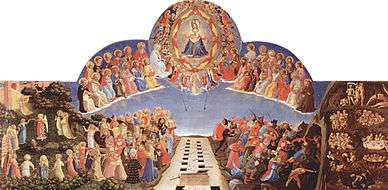The Sheep and the Goats

The Sheep and the Goats or "The Judgment of the Nations" is a discourse of Jesus recorded in the New Testament. It is sometimes characterized as a parable, although unlike most parables it does not purport to relate a story of events happening to other characters.
The common futurist explanation of the discourse is that it tells of the Last Judgment, and the division of all the world's people into the blessed, on the Right Hand of God, who are welcomed by the Father to inherit the Kingdom and eternal life, and the cursed, who are cast into the eternal fire along with the devil and his angels. The division seems to be based on the acts of kindness and mercy done by people to their disadvantaged fellow people; Jesus identifies such kindness with kindness towards himself.
An alternative interpretation, put forward by Calvinist theologian John Gill, is that the disadvantaged spoken of are actually fellow Christians. Instead of the division between blessed and cursed being based on good works, it is based on one's response to the people and message of Christ's Church. Associate professor of Biblical Languages at Union Presbyterian Seminary, E. Carson Brisson, says, "Let it be noted that this list of afflicted and needy individuals is, at first glance, a list of the very ones who appear to be bereft of God's favor. These are ‘the least.’ These are truly ‘other.’"[1]
Text of the passage
| Christian eschatology |
|---|
| Eschatology views |
|
Contrasting beliefs |
|
Biblical texts
|
|
Key terms
|
| Christianity portal |
The text of the passage appears in Matthew's Gospel, and is the final portion of a section containing a series of parables. From Matthew 25:31–46:
"But when the Son of Man comes in his glory, and all the holy angels with him, then he will sit on the throne of his glory. Before him all the nations will be gathered, and he will separate them one from another, as a shepherd separates the sheep from the goats. He will set the sheep on his right hand, but the goats on the left. Then the King will tell those on his right hand, ‘Come, blessed of my Father, inherit the Kingdom prepared for you from the foundation of the world; for I was hungry, and you gave me food to eat. I was thirsty, and you gave me drink. I was a stranger, and you took me in. I was naked, and you clothed me. I was sick, and you visited me. I was in prison, and you came to me.’“Then the righteous will answer him, saying, ‘Lord, when did we see you hungry, and feed you; or thirsty, and give you a drink? When did we see you as a stranger, and take you in; or naked, and clothe you? When did we see you sick, or in prison, and come to you?’
“The King will answer them, ‘Most certainly I tell you, because you did it to one of the least of these my brothers , you did it to me.’ Then he will say also to those on the left hand, ‘Depart from me, you cursed, into the eternal fire which is prepared for the devil and his angels; for I was hungry, and you didn’t give me food to eat; I was thirsty, and you gave me no drink; I was a stranger, and you didn’t take me in; naked, and you didn’t clothe me; sick, and in prison, and you didn’t visit me.’
“Then they will also answer, saying, ‘Lord, when did we see you hungry, or thirsty, or a stranger, or naked, or sick, or in prison, and didn’t help you?’
“Then he will answer them, saying, ‘Most certainly I tell you, because you didn’t do it to one of the least of these, you didn’t do it to me.’ These will go away into eternal punishment, but the righteous into eternal life.”
See also
References
- ↑ Brisson, E Carson. "Matthew 25:14-30." Interpretation 56.3 (2002): 307-310. ATLA Religion Database with ATLASerials. Web. 5 Sept. 2013.
